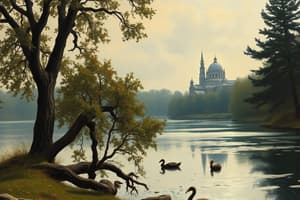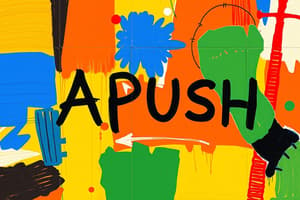Podcast
Questions and Answers
Who were the War Hawks?
Who were the War Hawks?
- Members of Congress advocating for war against Britain in 1812 (correct)
- Federalists opposing the war
- Members of the British Parliament
- A group of Native American leaders
Who was Henry Clay?
Who was Henry Clay?
A Whig political leader who worked to keep the United States united despite controversies over slavery.
What was Tecumseh known for?
What was Tecumseh known for?
Leading a confederacy of Native American tribes opposing the United States.
What did the Prophet aim to accomplish?
What did the Prophet aim to accomplish?
What was the Battle of Tippecanoe?
What was the Battle of Tippecanoe?
What does strict interpretation of the Constitution refer to?
What does strict interpretation of the Constitution refer to?
Who was John Marshall?
Who was John Marshall?
What is judicial review?
What is judicial review?
What was the significance of Marbury v. Madison?
What was the significance of Marbury v. Madison?
What was the Hartford Convention?
What was the Hartford Convention?
Who was Toussaint L'Ouverture?
Who was Toussaint L'Ouverture?
What were the Barbary Pirates known for?
What were the Barbary Pirates known for?
What is impressment?
What is impressment?
What was the Embargo Act of 1807?
What was the Embargo Act of 1807?
Study Notes
War Hawks
- Congress members advocating for war against Britain in 1812.
- Primarily from southern and western states driven by expansionist goals, particularly the aim to acquire Canada and Florida.
Henry Clay
- Prominent Whig leader in the early 19th century.
- Known for efforts to maintain national unity amidst slavery debates.
- Represented Kentucky in both the House of Representatives and the Senate.
Tecumseh
- Shawnee Native American leader who opposed U.S. expansion.
- Created Tecumseh's Confederacy, an alliance of tribes during Tecumseh's War.
- Allied with Britain in the War of 1812.
Prophet
- Tecumseh's brother who sought to unify Northwestern tribes against U.S. encroachment.
- His tribal confederacy was defeated at the Battle of Tippecanoe in 1811 by General William Henry Harrison.
Battle of Tippecanoe
- In 1811, a significant conflict between Native American warriors led by Tecumseh and U.S. forces under General Harrison.
- Marked the escalation of tensions between Native tribes and American settlers.
Strict Interpretation
- Legal approach emphasizing a literal reading of the Constitution.
- Ignores shifts in social and technological contexts since its adoption.
John Marshall
- Fourth Chief Justice of the Supreme Court (1801-1835).
- Established foundational principles of U.S. constitutional law.
- Influenced the Supreme Court's role as a coequal government branch.
Judicial Review
- The power of the Supreme Court to evaluate the constitutionality of legislative acts.
- Established as a key mechanism for interpreting the Constitution.
Marbury v. Madison
- Landmark Supreme Court case establishing the practice of judicial review.
- Set a precedent for the Court's authority under Article III of the Constitution.
Hartford Convention
- A series of meetings by New England Federalists (Dec 1814 - Jan 1815) discussing grievances about the War of 1812.
- Featured debates about federal power, with extreme proposals for secession from the U.S. ultimately not gaining majority support.
Toussaint L'Ouverture
- Leader of the Haitian Revolution.
- Declared governor of the island by the French in 1794; expelled foreign troops.
- Arrested by Napoleon when he attempted to re-establish slavery; died in a French prison.
Barbary Pirates
- North African pirates operating out of ports like Algiers and Tripoli.
- Known for ship seizures and coastal raids on European towns.
- Main goal was to capture Christian slaves for the Ottoman slave trade.
Impressment
- The act of forcibly recruiting individuals into military or naval service.
- Common practice among several navies throughout history.
Embargo Act
- Enacted in 1807 under President Thomas Jefferson, banning U.S. trade with foreign ports.
- Responded to French and British trade restrictions affecting neutral nations, particularly the U.S.
Studying That Suits You
Use AI to generate personalized quizzes and flashcards to suit your learning preferences.
Description
Test your knowledge with these flashcards covering essential vocabulary from AP U.S. History Period 4. Learn key terms and figures that shaped America's expansion and politics during the early nineteenth century, including the War Hawks and influential leaders like Henry Clay.




